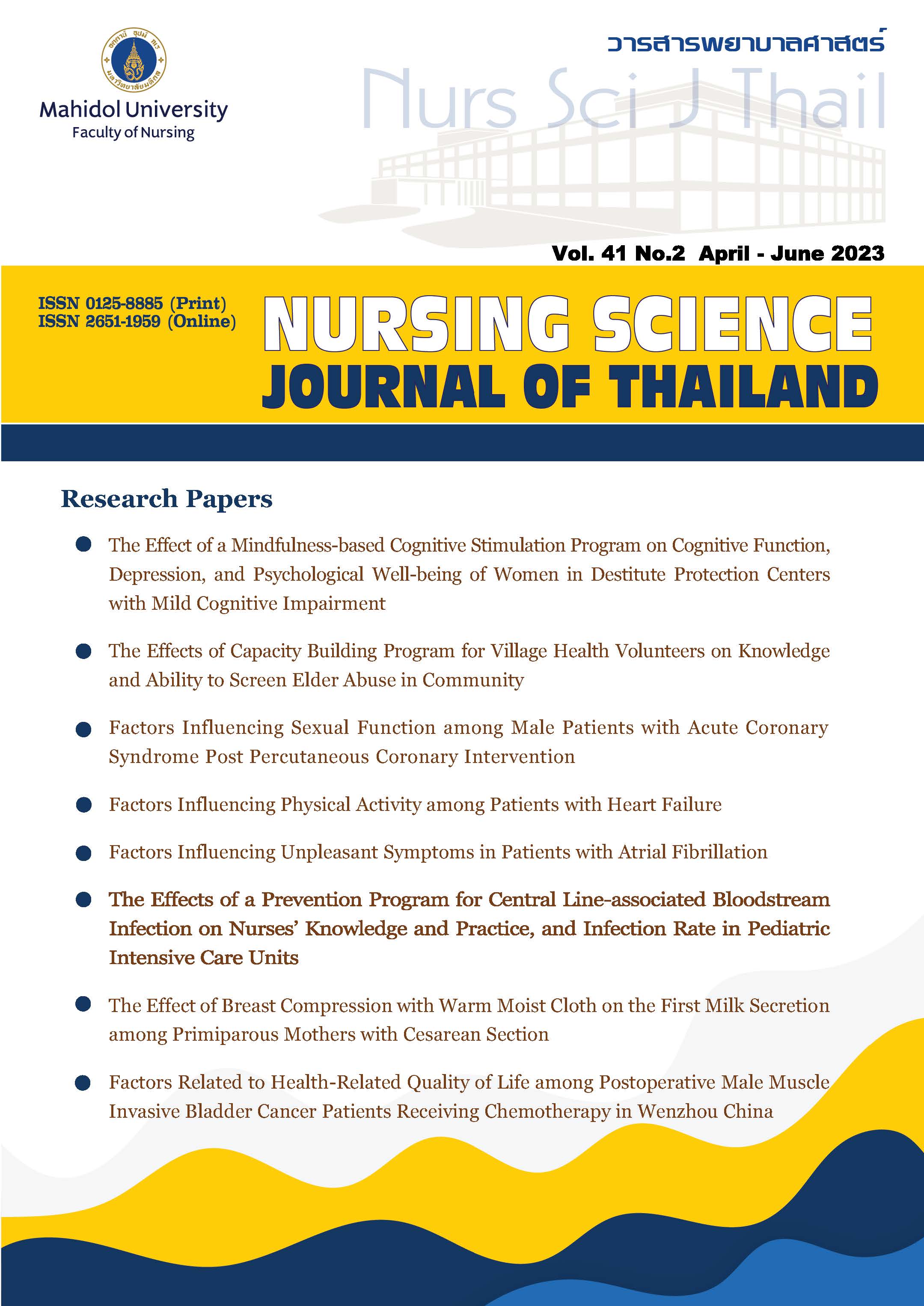The Effects of Capacity Building Program for Village Health Volunteers on Knowledge and Ability to Screen Elder Abuse in Community
Main Article Content
Abstract
Purpose: To study the effects of a capacity building program for village health volunteers on knowledge and ability to screen elder abuse in community.
Design: Quasi-experimental research design.
Methods: Sixty village health volunteers were divided into the control and experimental group with 30 each who lived in a province of Thailand. The experimental group received the capacity building program for screening elder abuse based on participatory learning concept for 8 weeks which comprised elder abuse screening education and training, screening elder abuse in the community, assessment of village health volunteer working in community, and focus group discussion. Data were collected using a set of questions to assess elder abuse knowledge and ability to screen elder abuse before and after the program implemented. Data were analyzed using descriptive statistics and t-test.
Main findings: The results revealed that the experimental group had higher scores of knowledge and ability regarding elder abuse screening at post program than that at pre-program (p < .001) and that in the control group (p < .001).
Conclusion and recommendations: An appropriate knowledge and skill toward elder abuse and participatory learning could enhance village health volunteers’ knowledge and ability to perform elder abuse screening. Thus, nurse should increase accurate understanding and important skills toward elder abuse screening in community for village health volunteers by allowing them to participate in discussion, practice elder abuse screening and discuss the problem and suggestion after performing elder abuse screening.
Article Details

This work is licensed under a Creative Commons Attribution-NonCommercial-NoDerivatives 4.0 International License.
Copyright Notice: Nursing Science Journal of Thailand has exclusive rights to publish and distribute the manuscript and all contents therein. Without the journal’s permission, the dissemination of the manuscript in another journal or online, and the reproduction of the manuscript for non-educational purpose are prohibited.

Disclaimer: The opinion expressed and figures provided in this journal, NSJT, are the sole responsibility of the authors. The editorial board bears no responsibility in this regard.
References
Department of Older Persons. Statistics of older persons in 77 provinces [Internet]. Bangkok: Department of Older Persons, Ministry of Social Development and Human Security; 2021 [cited 2021 Dec 2]. Available from: http://www.dop.go.th/download/knowledge/th1610815306-335_0.pdf. (in Thai).
Summawong K, Somanusorn S, Sumngern C. Factors related to elder abuse from perspectives of older adults and family members. Journal of Boromarajonani College of Nursing, Bangkok. 2017;33(1):90-103. (in Thai).
Acob JRU. Lived experiences of the abused elderly. Public Health of Indonesia. 2018;4(1):1-8.
Chananin Y, Jullamate P. Nursing care for empowerment of abused older persons. Nursing Journal of the Ministry of Public Health. 2017;27(3):29-41. (in Thai).
World Health Organization. Elder abuse [Internet]. Geneva: WHO; 2021 [cited 2021 Dec 2]. Available from: https://www.who.int/news-room/fact-sheets/detail/elder-abuse.
Chompunud S, Charoenyooth C, Palmer MH, Pongthavornkamol K, Vorapongsathorn T, Jitapunkul S. Prevalence associated factors and predictors of elder abuse in Thailand. Pac Rim Int J Nurs Res. 2010;14(4):283-96.
Sherer P, Wongyai N, Charoensukployphol B. Social protection networks: the social immunity development against social harm on the elderly persons. Nakhon Pathom: Golden Time Printing; 2014. 153 p. (in Thai).
Whangmahaporn P. Thai elder abuse problems and prevention. International Journal of Crime, Law and Social Issues. 2019;6(2):46-56.
Office of Social Development and Human Security, Phetchaburi Province. Report on the social situation in Phetchaburi Province 2020 [Internet]. Phetchaburi: Office of Social Development and Human Security, Phetchaburi Province; 2020 [cited 2021 Nov 30]. Available from: http://phetchaburi.m-society.go.th/wp-content/uploads/2020/09/รายงานสถานการณ์ทางสังคมจังหวัดเพชรบุรีปี-2563.pdf. (in Thai).
Pillemer K, Burnes D, Riffin C, Lachs MS. Elderly abuse: global situation, risk factors, and prevention strategies. Gerontologist. 2016;56 Suppl 2:S194-S205. doi: 10.1093/geront/gnw004.
Kulachai W. Elder abuse in Thailand: prevalence, causes, consequences, and public supports. International Journal of Management and Applied Science. 2018;4(10):52-6.
Ekasawin S, Chomchuen R. Screening tool of physical violence against the elderly with dementia for health volunteers. Journal of Mental Health of Thailand. 2014;22(1):11-24. (in Thai).
Ejaz FK, Rose M, Anetzberger G. Development and implementation of online training modules on abuse, neglect, and exploitation. J Elder Abuse Negl. 2017;29(2–3):73–101. doi: 10.1080/08946566.2017.1307153.
Van Royen K, Van Royen P, De Donder L, Gobbens RJ. Elder abuse assessment tools and interventions for use in the home environment: a scoping review. Clin Interv Aging. 2020;15:1793-807. doi: 10.2147/CIA.S261877.
Kolb DA. Experiential learning: experience as the source of learning and development. 2nd ed. New Jersey: Pearson Education; 2015. 416 p.
Cohen J. Quantitative methods in psychology: a power primer. Psychol Bull. 1992;112(1):155-9. doi: 10.1037//0033-2909.112.1.155.
Petmaneechote K, Pongpumma L, Arunkeeree A, Taowalanon P. Effectiveness of participatory learning program on knowledge and practice of village health volunteers for taking care of hypertension patients. Nursing Journal of the Ministry of Public Health. 2021;31(3):28-41. (in Thai).
Chiangpiew N, Boonchieng W, Aungwattana S. Effects of participatory learning regarding stroke prevention on knowledge and self-efficacy among village health volunteers. Nursing Journal. 2018;45(1):87-99. (in Thai).
Koseewongsanon N, Khaikheaw S, Puthiaungkul B. The effects of participatory learning program on knowledge and skills of the unofficial-time nurse supervisors at a tertiary level hospital in the Medical Service Department under the Bangkok Metropolitan Administration. Journal of Charoenkrung Pracharak Hospital. 2018;4(1):25-39. (in Thai).
Sanprasan P, Wattradul D, Jamsomboon K, Puapairoj V, Techangkul L, Yuyuen Y. Effects of health volunteer’s capacity building based on participating learning program on knowledge and skill of caring patients with cardiovascular disease and a risk group of cardiovascular disease. Thai Journal of Cardio-Thoracic Nursing. 2015;26(1):119-32. (in Thai).


